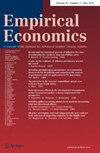国有银行的贷款是否出于政治动机?
IF 1.9
4区 经济学
Q2 ECONOMICS
引用次数: 0
摘要
本文研究了巴西最大的开发银行--巴西国家开发银行(BNDES)的年度付款与市长政治派别之间的关系。我们探索了一套差分(DiD)设计来评估政策干预的因果效应。利用巴西各市的数据,我们发现,市长属于支持联邦政府的联盟的市比市长不属于该联盟的市获得的拨款要高。有强有力的证据表明,位于联盟城市的企业获得的贷款平均较高。我们的研究结果支持这样一种观点,即政治偏见可能会扭曲国有银行的信贷分配。本文章由计算机程序翻译,如有差异,请以英文原文为准。

Are the loans of state-owned banks politically motivated?
This paper investigates the relationship between annual disbursements of Brazil’s largest development bank, BNDES, and mayors political affiliation. We explore a set of Difference-in-Difference (DiD) designs to evaluate causal effects of policy interventions. Using data of Brazilian municipalities, we find that municipalities with mayors belonging to the coalition that supports the Federal government get higher disbursements than the ones with mayors that are out of the coalition. There is strong evidence that firms located in allied municipalities receive average higher loans. Our findings support the view that political bias may distort the credit allocation of state-owned banks.
求助全文
通过发布文献求助,成功后即可免费获取论文全文。
去求助
来源期刊

Empirical Economics
Multiple-
CiteScore
4.40
自引率
0.00%
发文量
157
期刊介绍:
Empirical Economics publishes high quality papers using econometric or statistical methods to fill the gap between economic theory and observed data. Papers explore such topics as estimation of established relationships between economic variables, testing of hypotheses derived from economic theory, treatment effect estimation, policy evaluation, simulation, forecasting, as well as econometric methods and measurement. Empirical Economics emphasizes the replicability of empirical results. Replication studies of important results in the literature - both positive and negative results - may be published as short papers in Empirical Economics. Authors of all accepted papers and replications are required to submit all data and codes prior to publication (for more details, see: Instructions for Authors).The journal follows a single blind review procedure. In order to ensure the high quality of the journal and an efficient editorial process, a substantial number of submissions that have very poor chances of receiving positive reviews are routinely rejected without sending the papers for review.Officially cited as: Empir Econ
 求助内容:
求助内容: 应助结果提醒方式:
应助结果提醒方式:


